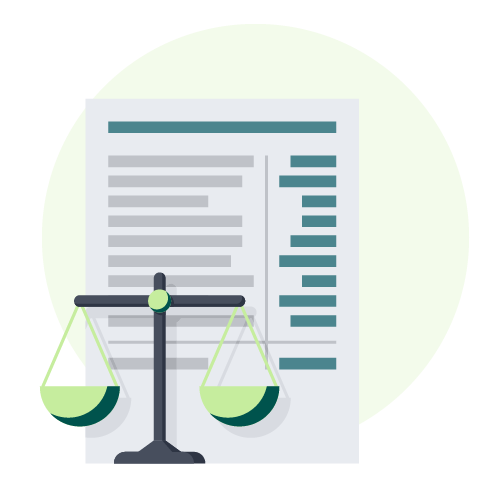Certificated enforcement agents (formerly known as certificated bailiffs) are the most common type of bailiffs. They act on a warrant or Liability Order issued by the court for debts such as: unpaid court fines, rent arrears; council tax arrears; parking fines; non-domestic rates; and child support agency arrears. Civil enforcement involves recovering unpaid taxes and fines on behalf of central government and local authorities, as well as other public bodies, such as National Highways, Transport for London and HM Courts & Tribunals Service.
They are normally employed by a private company and, as such, are not officers of the court, but they are certificated by the court. The certification process enables the court to exercise a degree of control over the standards of competence and conduct of these bailiffs.
The certificate, granted by the County Court, authorises the enforcement agent to levy distress anywhere in England and Wales. The certificate must be renewed every two years. To qualify for a certificate, the applicant must satisfy the court that they are a “fit and proper” person to act as an enforcement agent. In particular, the applicant must prove that they have a “sufficient knowledge of the law and procedure evidenced by Level 2 or equivalent Training in the Taking Control of Goods Regulations and provide a security bond.
CIVEA is aware that the ‘Certificated Bailiff Register’ administered by HMCTS may not contain up to date entries for all certificated enforcement agents.
If you have searched the Register but are unable to find the enforcement agent’s name, you can contact the Civil National Business Centre, at CNBC, St. Katharine's House, 21-27 St. Katharine's Street, Northampton, NN1 2LH, or by calling 0300 123 1056. Staff at the CNBC will be able to advise you which county court issued the enforcement agent’s certificate and when.
Further guidance regarding different types of enforcement agents can be found here.
If you are concerned about fraud, please contact the enforcement agency that employs the named agent to verify their details.
Please stay vigilant against fraudsters posing as enforcement officers, for more information please visit: https://www.gov.uk/government/news/guidance-on-bailiff-and-enforcement-officer-scam
CIVEA members uphold high standards and our agents are qualified and certificated.
However, people may be at risk from fraudsters masquerading as enforcement agents (bailiffs). Small businesses are a popular target.
CIVEA has identified cases of fraudsters using the government’s public register of enforcement agents to demand payments for bogus government debts or advertising fees. The details of certificated enforcement agents are used to put pressure on people to pay quickly saying that costs will go up if they delay.
We want to protect people from bogus bailiffs who are using legitimate certificated agents’ details. These fraudsters appear very convincing, but do not be hurried and always check before making any payments
Here is some guidance on avoiding being a victim of a bogus bailiff:
If you are unsure, our members are happy for you to call their offices to check that an agent is legitimate. You can view our members here.
In 2014 new rules concerning the recovery of money from debtors were brought in.
CIVEA members enforce non-High Court orders, which relate to debts for things like council tax, child support, traffic and parking offences or magistrates’ court fines.
Below we’ve outlined the process of a non-High Court order and the fees to expect.
If you have not paid a debt or a fine, it is tempting to ignore letters and calls. But this might add more costs.
Always reply to attempts to contact you. You may be able to make an arrangement to pay.

If you have a debt that has not been paid, the individual body applies to the court to issue a court order, this could be a liability order or a warrant of control which starts the process to recover the money.

The warrant or order may then be given to an enforcement company to recover the debt. If so, a fee of £75 is added to the amount owed.

The first step in the three-stage enforcement process is the compliance stage where you are sent a ‘Notice of Enforcement’.
This gives details of:
You will have at least seven days (not including Sundays or Bank Holidays) before any further action is taken by the enforcement company.
At this point you should contact the enforcement company immediately to arrange for payment to be made to them.
Once a debt is with an enforcement agent, you are required to pay them, rather than the creditor (local authority or government department) you owe money to.
If you are unable to pay you should still telephone the enforcement company and explain why.
The ‘Notice of Enforcement’ includes contact details for free debt advice services, so if you’re having difficulty then it might be a good idea to get in touch with them.

If the enforcement agent or company doesn’t hear from you by the date stated, they will move the matter to the enforcement stage.
This means you’ll have at least one visit from an enforcement agent to arrange payment, and an additional £235 (plus 7.5% of the original debt over £1500) will be added to the amount owed. This fee will be added when the visit takes place, even if the agent only leaves a letter and doesn’t speak to you in person.
The enforcement agent will carry a copy of the warrant or their instructions to act on their mobile device, together with their enforcement agent certificate and photographic ID.
They are not obliged to inform you of the precise date and time of a visit. It could be anytime from 6am – 9pm on any day including Sundays, and religious or public holidays.
Sometimes the enforcement agent may consider entering into a controlled goods agreement with you. This means a list is drawn up of what could be removed at a later date if you do not come to an alternative arrangement. Making a controlled goods agreement gives you a final chance to pay your debt rather than having your goods removed.

If full payment is not made you risk having your possessions removed for sale by the enforcement agent. This is the sale stage.
A fee of £110 (plus 7.5% of the original debt over £1500) is added to the amount owed to cover costs for moving the possessions so they can be sold.
Additional (actual) costs for other expenses, such as hiring a locksmith, storing goods or auction costs, may be applied. Further expenses are limited and must be approved by the court.
The information contained on these pages is provided only as a guide. If you have a question or are unsure about what you should do, please contact the free advice services listed on your ‘Notice of Enforcement’ or seek legal help.
For general enquiries only, you can contact us by email at info@civea.co.uk.
We are unable to respond to complaints made via this form. If you have a complaint or concern about one of our members, please go to our complaints page for more information.
